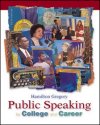 |
1 |  | 
An extended definition is richer and fuller than a dictionary definition. |
|  | A) | True |
|  | B) | False |
 |
 |
2 |  | 
A description speech does not need to make a point, but can be merely a list of facts and observations. |
|  | A) | True |
|  | B) | False |
 |
 |
3 |  | 
For a description speech about a physical object such as the Golden Gate Bridge, you would probably use the spatial pattern. |
|  | A) | True |
|  | B) | False |
 |
 |
4 |  | 
For some process speeches, it is not your goal to teach the audience how to perform a process. |
|  | A) | True |
|  | B) | False |
 |
 |
5 |  | 
Live demonstration-rather than videotape-must always be used in a process speech. |
|  | A) | TRUE |
|  | B) | FALSE |
 |
 |
6 |  | 
For learning new material, the auditory channel is better than the visual channel. |
|  | A) | True |
|  | B) | False |
 |
 |
7 |  | 
An expository speech, which is also called an oral report or lecture, involves explaining a concept or situation. |
|  | A) | True |
|  | B) | False |
 |
 |
8 |  | 
The best motivator in a speech is an item that has an impact on the lives of the listeners. |
|  | A) | True |
|  | B) | False |
 |
 |
9 |  | 
The most important element in a speech, says TV and radio reporter Nina Totenberg, is interesting information. |
|  | A) | True |
|  | B) | False |
 |
 |
10 |  | 
The text advises that you use generalities sparingly. |
|  | A) | True |
|  | B) | False |
 |
 |
11 |  | 
During long, multi-hour presentations, speakers should avoid calling on people at random. |
|  | A) | True |
|  | B) | False |
 |
 |
12 |  | 
During a long presentation, you should give breaks and resume the meeting promptly at the time specified. |
|  | A) | True |
|  | B) | False |
 |
 |
13 |  | 
To make information interesting, give as many details as possible. |
|  | A) | True |
|  | B) | False |
 |
 |
14 |  | 
You should never go over concepts that a significant number of listeners already know. |
|  | A) | True |
|  | B) | False |
 |
 |
15 |  | 
When you want to explain or describe something that is unfamiliar to your audience, you should relate it to something that is familiar. |
|  | A) | True |
|  | B) | False |
 |



 2002 McGraw-Hill Higher Education
2002 McGraw-Hill Higher Education